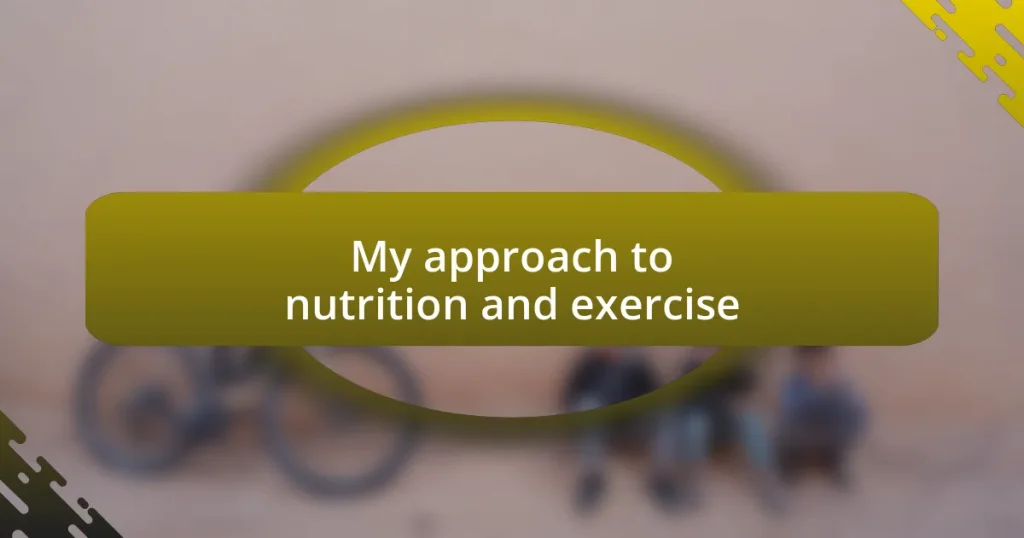Key takeaways:
- Power is rooted in influence and respect, while control often arises from fear; effective leadership requires recognizing this distinction.
- Establishing clear boundaries and encouraging autonomy fosters trust and collaboration, enhancing overall team morale.
- Personal power is linked to self-awareness, empathy, and vulnerability, leading to stronger connections with team members.
- Reflecting on experiences and embracing uncertainty can drive personal growth and improve leadership effectiveness.
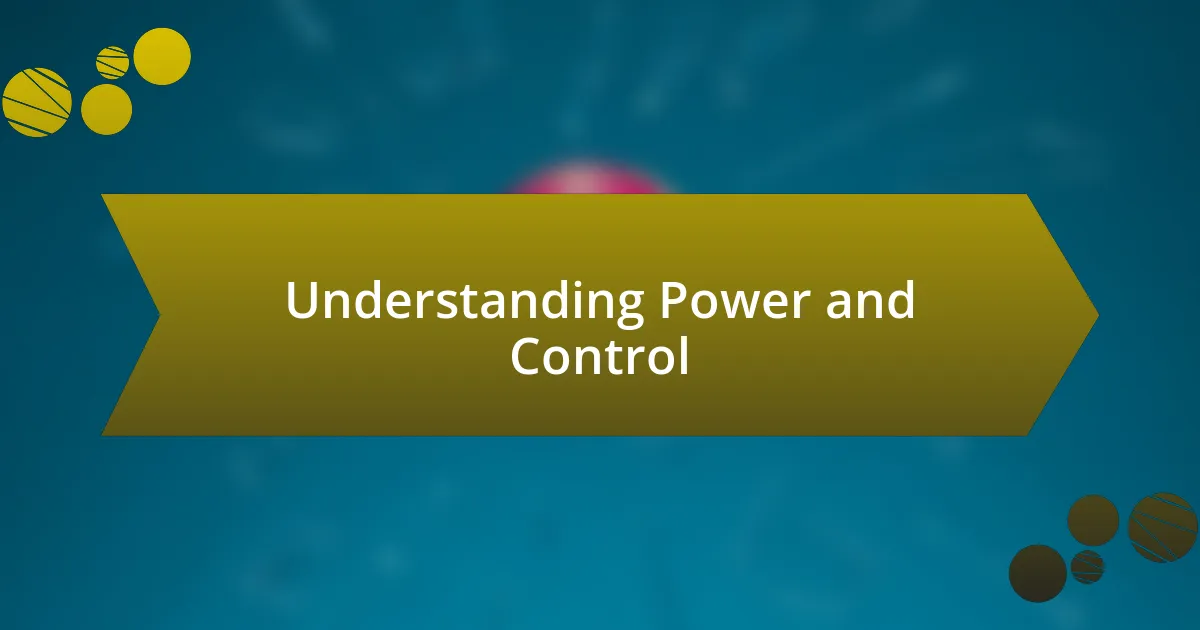
Understanding Power and Control
Power and control are often perceived as synonymous, but I’ve learned they can manifest in different ways. For instance, in my early career, I found myself in a leadership position that felt more about maintaining authority than fostering collaboration. Is it truly power if it alienates those around you?
Reflecting on my experiences, I recognize that power derives from influence and respect, while control can stem from fear and compliance. There was a time when I led a team with a heavy hand, only to realize that empowerment, not domination, brought out the best in everyone. It wasn’t until I started listening more and controlling less that I noticed a profound shift in team dynamics.
Understanding the balance between power and control is essential, yet often overlooked. I have felt the frustration of wanting to assert my authority but discovering the real strength lies in building lasting relationships. How does that shift our perception of leadership? It challenges us to rethink what it means to lead effectively.
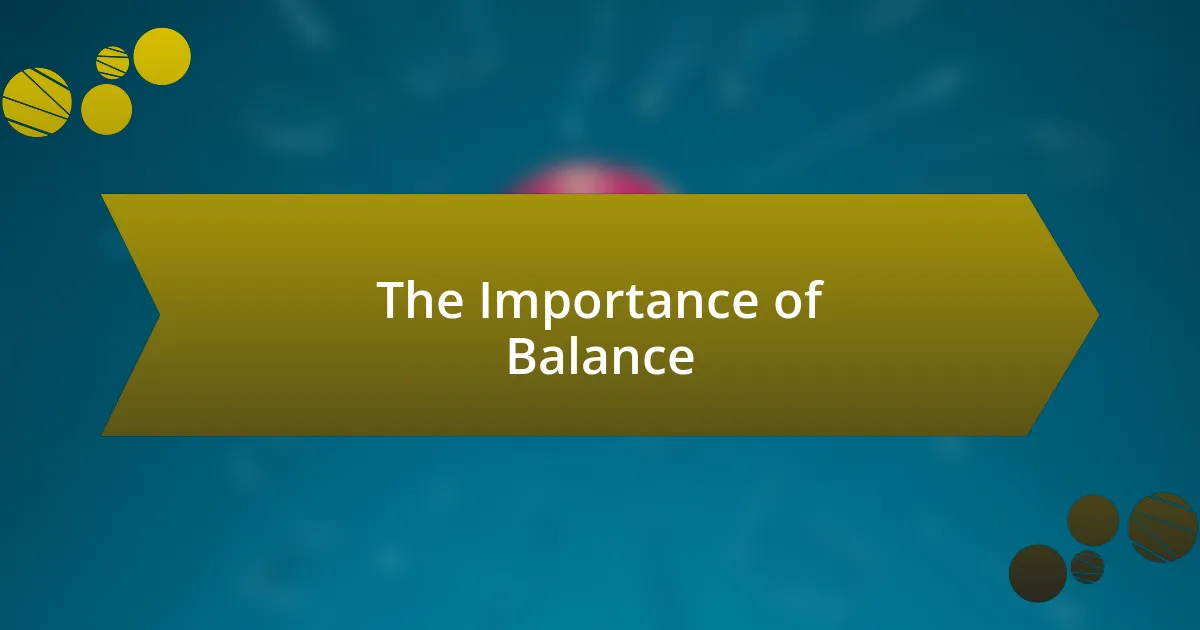
The Importance of Balance
Finding the right balance between power and control is crucial for effective leadership. In my own experience, I’ve seen leaders who wield authority excessively, creating an environment of fear rather than trust. I recall a project where a micromanaging approach stifled innovation. When I shifted to encourage my team’s input, it was eye-opening to see how much more motivated they became.
To illustrate the importance of balance, consider these key points:
- Empowerment vs. Domination: Granting autonomy can lead to enhanced productivity.
- Trust Over Fear: A secure environment fosters open communication and collaboration.
- Responsiveness: Balancing power allows for adaptability in leadership styles based on team needs.
- Sustainable Impact: Long-term success is rooted in mutual respect rather than superficial control.
By recognizing these distinctions, I’ve learned that true leadership is about inspiring others while maintaining a harmonious equilibrium between power and control.
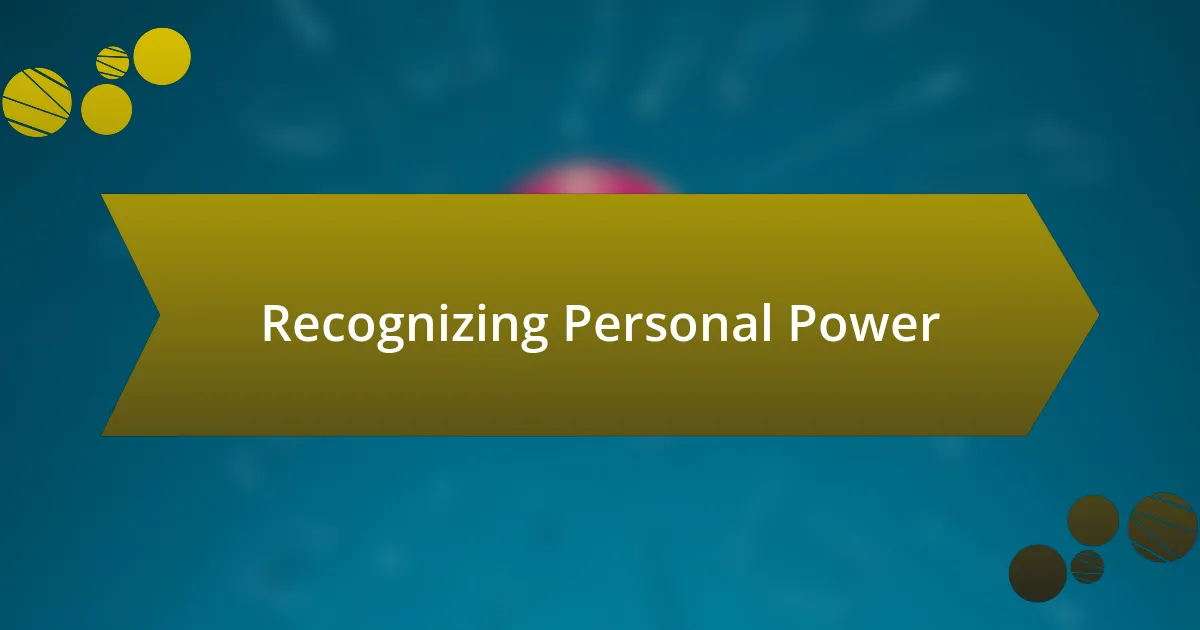
Recognizing Personal Power
Recognizing personal power starts with self-awareness. I remember a time when I felt overwhelmed by external pressures, failing to acknowledge my own strengths. It wasn’t until I took a step back, reflected on my past achievements, and assessed my unique capabilities that I began to understand the influence I had within my own environment.
In my journey, I discovered that personal power isn’t just about authority or control; it’s about understanding how my decisions affect those around me. For instance, during a challenging project, I realized that my ability to listen and empathize with team members boosted morale significantly. The more I recognized the impact of my choices, the more empowered I became to lead with intention.
Lastly, embracing vulnerability is a crucial component of recognizing personal power. I’ve faced scenarios where admitting my uncertainties led to stronger connections with my team. This openness not only fostered a culture of trust but also empowered others to embrace their own power. Acknowledging my personal power transformed my approach to leadership and deepened my relationships with those I value.
| Concept | Description |
|---|---|
| Self-Awareness | Understanding one’s strengths and weaknesses enhances personal power. |
| Empathy in Leadership | Listening and connecting with others increases influence and morale. |
| Vulnerability | Being open about uncertainties builds trust and empowers collective growth. |
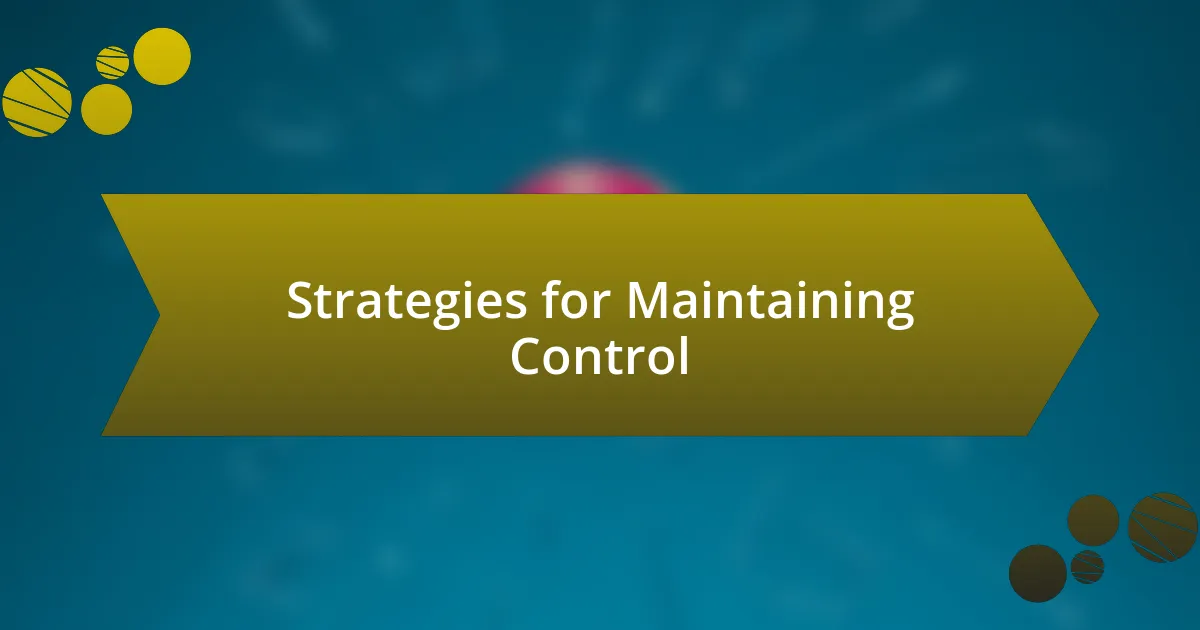
Strategies for Maintaining Control
When it comes to maintaining control, establishing clear boundaries is vital. I recall a time when my workload spiraled out of control because I didn’t assert my limits. By communicating my availability and setting specific tasks, I was able to regain focus and energy, allowing me to lead more effectively.
Another strategy that has proven invaluable for me is prioritizing consistent reflection. Taking a moment at the end of each day to evaluate my decisions has been transformative. It’s surprising how much clarity comes from simply asking myself what worked, what didn’t, and how I can adapt my approach going forward.
Lastly, surrounding myself with a supportive network has been a game-changer. Engaging with colleagues who share similar values provides not just accountability but also diverse perspectives. I’ve found that opening conversations about our struggles and successes strengthens our collective control over chaotic situations, making us feel more empowered. Have you experienced a shift in your control by fostering such relationships? I know I have, and each connection has reinforced my resilience.

Effective Communication Techniques
Effective communication begins with active listening. I remember a project meeting where I focused entirely on tuning into my team rather than just waiting for my turn to speak. By truly engaging with their ideas, I noticed a shift in our dynamic; suddenly, everyone felt valued, and the conversation flowed more freely. Have you ever found that listening deeply made a difference in your interactions?
Using “I” statements has also been a fundamental technique for me. For instance, when discussing feedback, I express my feelings by saying, “I feel concerned when timelines are missed.” This approach not only conveys my perspective but also invites a more constructive dialogue. It allows others to see my viewpoint while encouraging open conversation rather than defensiveness. Isn’t it interesting how a simple change in wording can transform a discussion?
Nonverbal signals play a crucial role as well. When I consciously maintain eye contact and use open body language, I can feel the connection deepening with others. I once led a workshop where participants felt hesitant to share at first. Once I adjusted my posture and smiled more, they began to open up. Have you noticed how your body language affects the atmosphere in your conversations? It’s remarkable how these small adjustments can foster trust and connection.
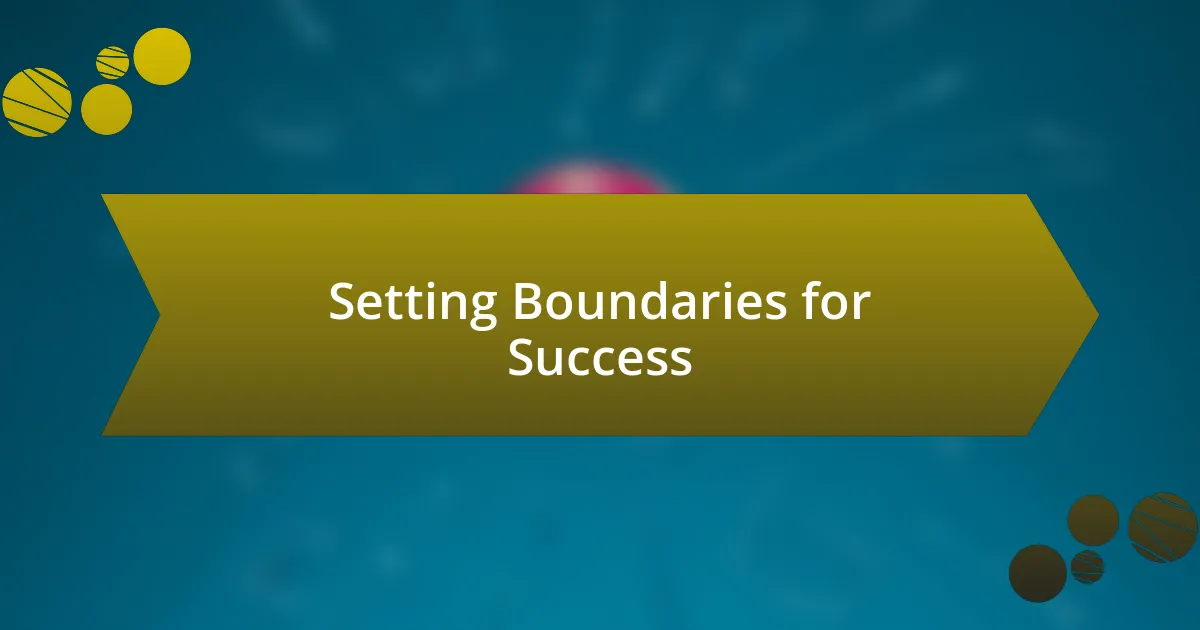
Setting Boundaries for Success
Setting boundaries is essential for achieving success in both personal and professional realms. I recall a time when my work life was spiraling out of control because I kept saying “yes” to every request. Eventually, I realized that without clear boundaries, my focus and productivity suffered. Have you ever felt overwhelmed simply because you didn’t set limits?
When I decided to carve out specific hours for work and personal time, I felt an immediate relief. This decision allowed me to recharge and be more present in both areas. It’s surprising how much energy I regained just by saying, “No, I can’t take on more right now.” How often do we underestimate the power of simply stepping back to prioritize our own needs?
I also learned that being transparent about my boundaries with colleagues helped establish mutual respect. One day, I explained to a co-worker that I couldn’t reply to emails outside of work hours. To my surprise, they appreciated my honesty and soon followed suit. Isn’t it fascinating how setting clear expectations can not only benefit you but also encourage others to do the same?
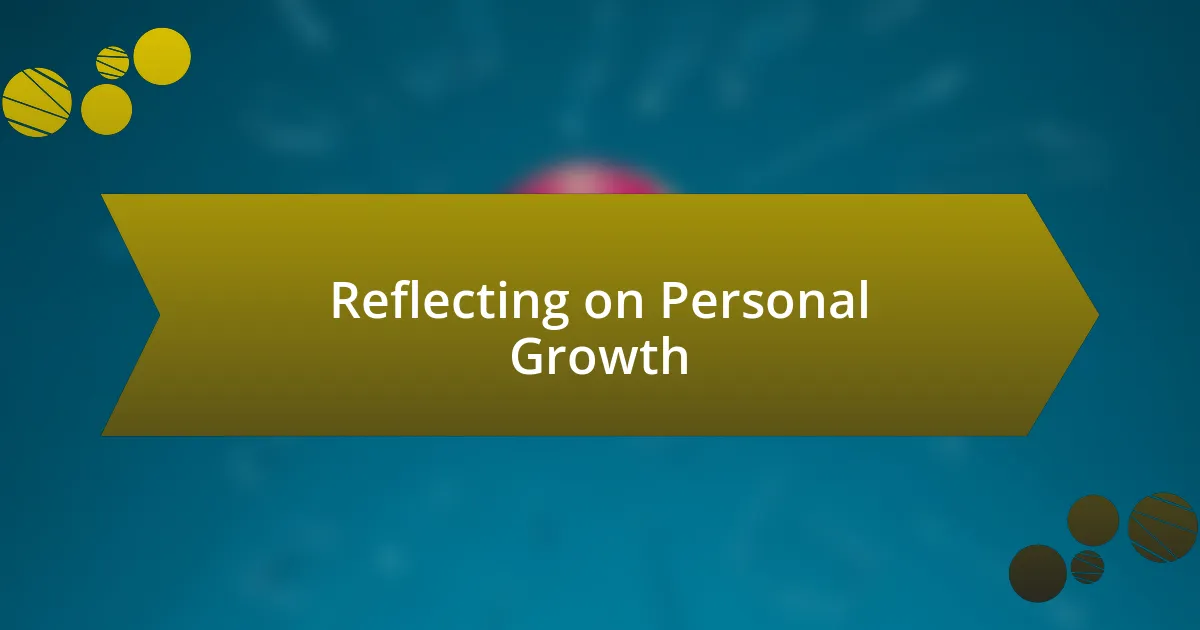
Reflecting on Personal Growth
Reflecting on personal growth can often feel like looking back at a long, winding journey. I remember a period when I struggled with the need for control in my life, believing it was essential to maintain power over my circumstances. It wasn’t until I embraced vulnerability and accepted that not everything could be managed that I truly began to evolve. Have you ever considered how releasing that grip can lead to unexpected opportunities for growth?
The moment I recognized my desire for control stemmed from fear made all the difference for me. I vividly recall a time when I let go of my need to micromanage a project at work. I empowered my team instead, and not only did they flourish, but I found myself learning from their insights. It taught me that sometimes, stepping back can actually propel us forward. Isn’t it liberating to discover that we can trust others to share the load?
Moreover, reflecting on my experiences has illuminated a vital lesson: growth often comes with discomfort. I’ve faced moments that challenged my beliefs about power and success, leading me to question what it truly means to be in control. Through these reflections, I learned that embracing uncertainty can pave the way for deeper connections and a more authentic sense of self. How have your struggles shaped your understanding of personal growth?













